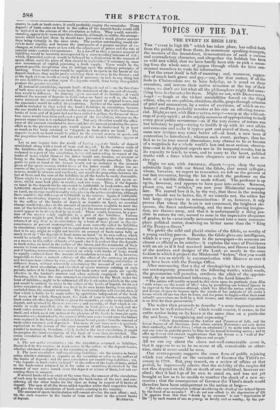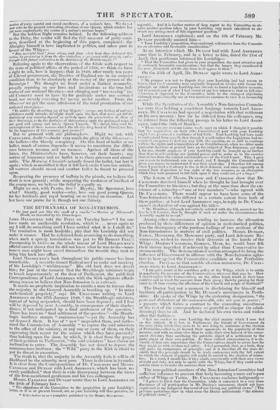TOPICS OF THE DAY.
TIIE EVENT IN HIGH LIFE.
TIrE " event in high life" which has taken place, has called forth from the public, and from those, its monstrous speaking-trumpets the masters of the broadsheet, demonstrations of such a curiou; and contradictory character, and altogether the hubbub has been so wild and wilful, that we have hardly been able to pick a mean- ing from the whole mass of jargon through which we have con- demned ourselves to wade for information.
Yet the event itself is full of meaning ; and, moreover, sugges. tree of much.both grave and gay,—nay, for that mutter, if all the fools in Christendom are to have holyday, as is usual on these occasions, and scream their native nonsense at the top of their voices, we don't see but what all the philosophers might find some- thing here in character for them. Might we not, with DE31 OURITUS, lough ? laugh at the violent sensibilities forced on the frigid editor, who, on COM pulsion, shudders, thrills, gasps through columns of grief and amnzement, by a series of exertions, of which an ex- hausted snuffbox probably remains at his side an affecting memo- rial. Might,we not, with HER ACLITI1S, weep ?—weep at the wild out- rage of party-spirit ; at the mkhly meanness of appropriating to itself every great public occurrence—as if the very course of nature was but tributary to party—trying to huddle it up with its own affairs and concerns and make it appear part and parcel of them, whereby some new intrigue inay come better olf—at least, a new bone of contention be introduced ; whereas such event, perhaps, thus be- lied as to its true moral dimensions, may chance to be or become of a magnitude for a whole world's ken and most serious observa- tion—not in its physical aspects nor in its temporal results, but in its capacity to teach, to warn, and to carry to the heart, political truths with a force which mere eloquence never did or can ar- rive at.
Might we not, with AaisToix, dispute ?—yea, chop the most admirable logic with our friend the Globe, that noted syllogist; whom, however, we regret to remember, we left on the ground at our last encounter, having the lot to catch the professor on the horn of a terrible dilemma in modo tollentli. The professor is up again, however, and appears to have gone into orders. Sermons, please you, not " articles," are now your Ministerial newspaper litre. 'We marvel how it is, by the way, that those in the morning organ should not be better, for, if we mistake not, the editor has had large experience in sermocination : if so, however, it only proves that where the heart is not concerned, the brightest elo- quence, the finest understanding, and the most glowing imagina- tion, are thrown away, and that it is unfortunately a thing pos- sible in nature for one, second to none in the impressive eloquence of genius, to be eecaslonally metamorphosed into a mere common- place political ranter, deserving no better name than the " King of the Penny-a-liners." We prefer the mild and placid strains of the Globe, so worthy of a young sucking parson. Besides, the Globe gives one intelligence, which is a very proper feature in the newspaper—its sermons are almost as official as its articles : it explains the ways of Providence with an air as if it had received instructions, and throws out hints of the motives and designs of the Lord, so nearly in the same fashion in which it projects the Ministerial "feelers," that you would swear it was as strictly in communication with Heaven as ever it may have been with the Foreign Office.
After announcing that a day of thanksgiving is to be appointed, our contemporary proceeds in the following words ; which words, the grammarian will perceive, attribute the affair of the appoint- ment, by an unintentional indecency, to the Lord himself-
" The nation will readily respond to this c/uint upon its gratitude from Him ' with whom are the issues of fife;' who, by permitting our beloved QUCC9 to be exposed to the atrocious attempt, which hos filled the nation with anxiety mid horror, designs to impress upon the minds of her subjects of all ranks a lesson which nil are too slow to learn, and too prone to forget,—that their most valuable possessions are held by a frail tenure, and their absolute dependence is on flir, for their preservation."
The writer then proceeds to describe " a more impressive scene than can be well conceived ;" which would consist, it seems, in the entire nation being on its knees at the same time on a particular day and hour, " recognizs'ng and expressing"
" their dependence on the Author and Preserver of Life, and the
Great Source of all blessings, from whom earthly Potentates not only derive their authority, but their lives; [what an admission to unite with one heart and one voice in grateful praise to Ilim for his recent delivering mercy ; and to offer up devout nod earnest supplications that his flows as a ' wall of fire' may continually • compass ' both Queen and people."
All we can say about the above not-well-conceivable scene is, that it appears to us to be no scene at all, conceivable or other- wise, since it never could be seen. Our contemporary suggests the same form of public rejoicing which was observed on the occasion of GUORGE the Third's re- covery in 1788. But, pray remark, on a review of affairs at that period, he ingenuously admits that the stability of the empire did not then depend on the life or death of one individual, however ex- alted; that it had legs of its own to stand on, and was not yet brought so low as to be unable to weather the shock of a new ac- cession ; that the consequence of GEORGE the Third's death would thereffire have been unimportant to the nation at large— But who can contemplate without shuddering the deadly' 071r beloved Queen by the Inind of an assassin ? We do not now allude to the deprivation of life [It appears from this that " death by an assassin" is not " deprivation of life "3 by such means of one so young, so lovely, and so worthy, by the Pa.
session of every mental and moral excellence, of a nation's love. We do not tans refer to the present interesting situation of our queen, which renders her yet more emphatically the centre of a nation's anxious hopes."
But the boldest flight remains behind. la the following address to the Deity, the reader will find the full measure of party-mad- ness, described at the beginning of this paper, completed : the Almighty himself is here implicated in politics, and takes part in favour of the Whigs-
1351, merciful God: ,froni whom, and from ?Ara 'nisi thou deliremd this nation, by prescoring it frontthe dire risitation, pp, !moot with prvsent, mut Si frOnght with future ea amities to the &stinks of the British empire Referring again to the observations of the Globe with respect to the state of political affairs at the period of 1788, IV" think we have a right to ask, how it happens that in 1840, after nearly ten years of Liberal government, the liberties of England are in no sounder condition than to be absolutely at the mercy of the person of the Sovereign ? We thought we lived under a limited monarchy, proudly reposing on our laws and institutions as the true bul- warks of our national liberties—not chirping and " tee-weeing" (as old ConnErr used to have it) for gratitude under one crowned head, nor meanly cowering for mercy under another. From the Observer we get the same admission of the total prostration of our natioual energies— "If, amidst the absorbing joy at her Majesty's escape, any feeling of national selfishness could intrude, we might dwell upon the tact, that never yet d«I the destinies of tiny country depend so entirely upon the presirrutimi to them their SOreleipli, as du the destinies of this country upon the prolonged reign of our good and young and lovtly queen Yietona. We shrolk from even the contemplation of those horrors which the nil-directing hand of Providence has, for the happiness of this country, just averted." But to proceed with our philosophers. Might we not, with CARNEADES, doubt ?—doubt very much the piety of the Obserrer- the bullets—the bloody conspiracy. On this head of bullet or no bullet, much of course depends—it seems to constitute the differ- ence between treason and no treason. Against all ideas of the latter, the Ministerialists have, however, set their hearts ; any notion of innocence and no bullet is to them grievous and abomi- nable. The Morning Chronicle actually found the bullet, but lost it again ; which so mortified it that it fell back on its Corn-law articles, till matters should mend and another bullet be found to proceed upon. Respecting the presence of bullets in the pistols, We believe the doubt is now general ; while respecting the weakness of intellect of the young man, we believe the Miff is equally so. Might we not, with PLATO, lore Heyday, Mr. Spectator, love what ? Gently, good reader—why, love our good young Queen, for her fortitude and royal bearing on so trying an occasion. Let her have our praise for it, though not our flattery.



























 Previous page
Previous page